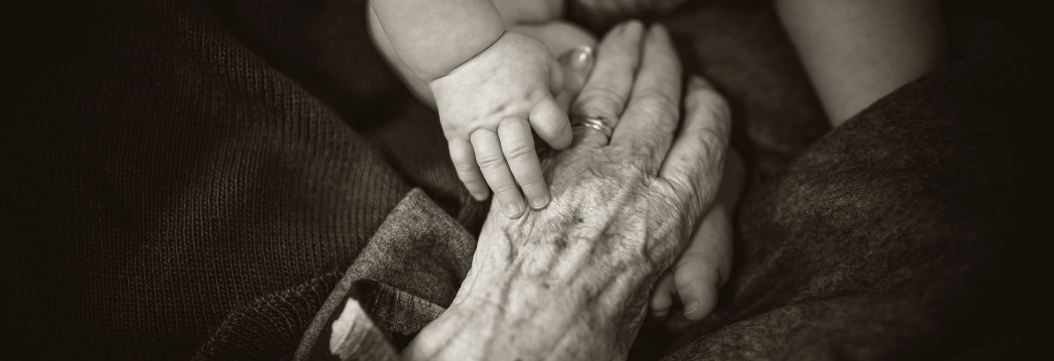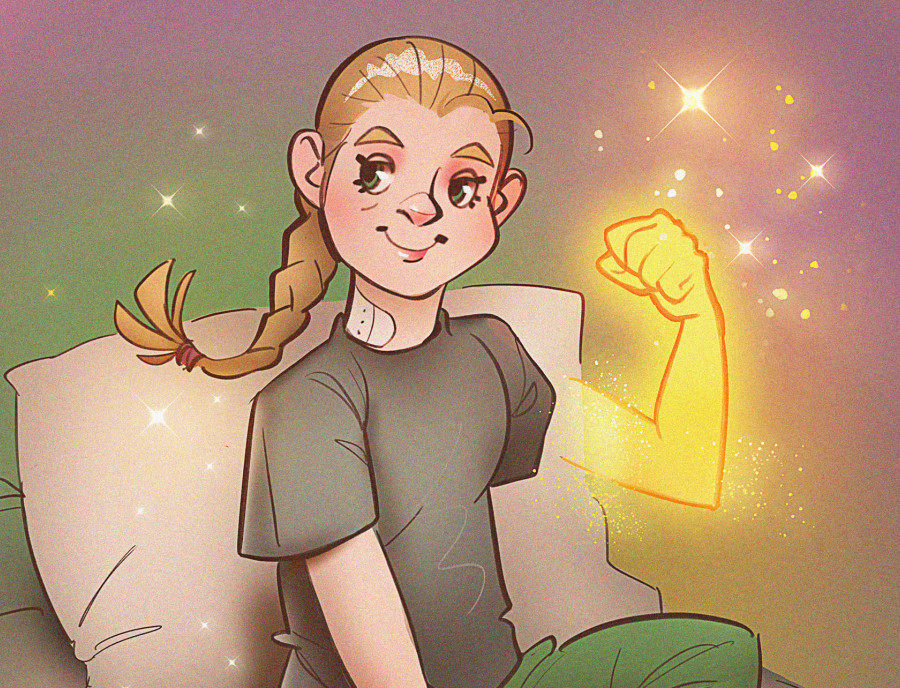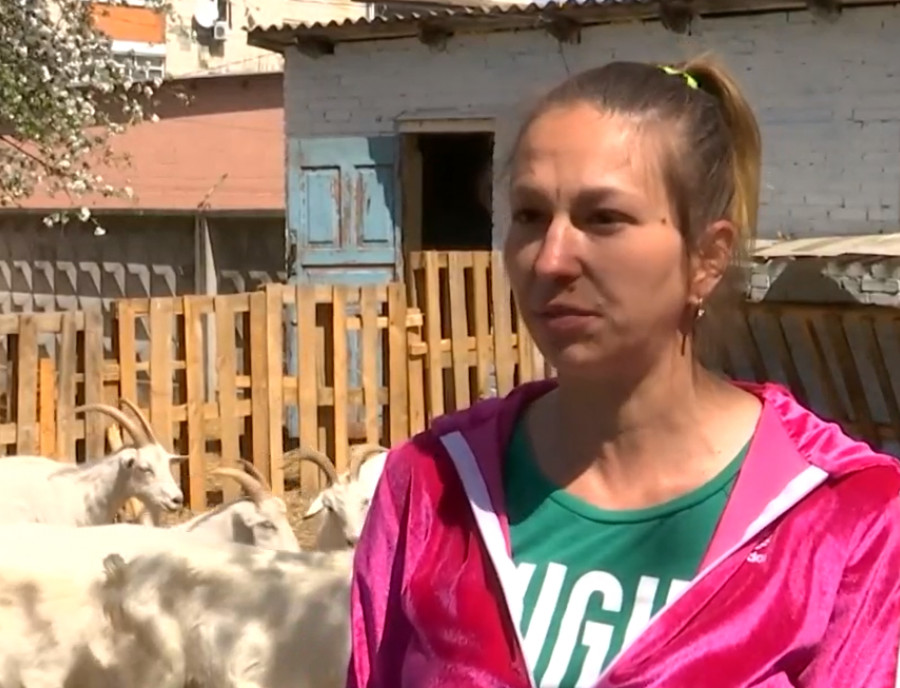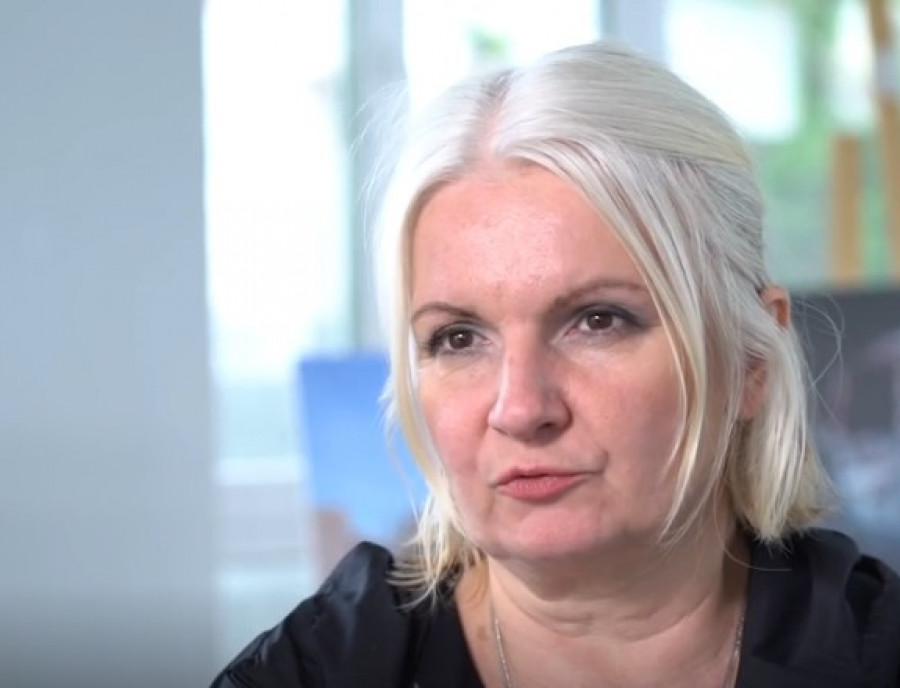Residents of one of the houses in Pokrovskyi residential complex in Hostomel spent a week in captivity. Sixty-seven people in a cold and damp basement, in complete isolation from information sources and the outside world. Olena Anishchenko miraculously escaped from Hostomel in a damaged car without a car battery...
From 24 February to 3 March, until my birthday, we were not yet in captivity. We still had the opportunity to move around more or less freely, if I can put it like that, as the bombing was constant. And on the third day [of March], right on my birthday, explosions around the house began. The building opposite our house, in a neighbouring residential complex, was hit, and our house was hit too.
There was a fire on some floors in other section of our building, which was next door. We realized that there were no other options. So our neighbours, who still stayed in the house, and we went down to the basement. It was the first day when I went down to the basement. From the 3rd [of March], they [the invaders] started to occupy the houses in the neighbourhood. They occupied our house on 4 March and set up their headquarters there. On 3 March, we went down to the basement for the first time and stayed there almost the whole day. Only at midnight, I went up home to take some more things because it was cold and damp in the basement. I went upstairs and thought that I could stay for the night there while it was more or less possible.
So I spent the night near the door in the corridor, where it was the least possible for a shell fragment to get there. It was the last night when I slept for 3-4 hours near the door. In the morning, explosions thundered around the house.
The bombing was very intense but I was not really ready to go down to the basement yet. I thought that I would go down, wait it out for a while there and go up home then. For some reason, I did not have any such feeling that we could be invaded and taken captive. Nobody probably expects this.
While I was at home, on 4 March, I collected some food for people from neighbouring flats who became homeless. I took it all with me and at that time, a very tough bombing began. The house was moving. It was shaking and windowpanes began to shatter. The windows in my flat just shattered all the way through. By that time, the windows in my flat had already been broken and it was very cold.
The kitchen was damaged by shell fragments and two windows were broken. The balcony door to the kitchen and all the kitchen windows were completely broken. In the meantime, I collected all this food walking over those fragments and pieces of glass. I thought that now I would quickly bring it down and would go back home again to collect at least something else. The bombing started and I went down to the basement with my stuff. When I was downstairs, I phoned my parents and said that I made it to the basement. And since we didn’t have electricity for several days…
We did not have gas supply either. We did not have electricity, but then they turned it on for a day. Those days, I turned off the phone to keep it charged as long as possible in order to have the telephone connection for later. So I said that I ran to the basement. Then I turned the phone off and thought that once it becomes quieter, I would go out and give them a call.
And that was my last call to my parents. On 10 March, we went down to the basement and about half an hour later, we heard some machine gun shooting.
We heard some voices, like a roll call. At that time, we were scared the most because it was really the most unexpected thing for us. That is, by that time, we got used to shooting and bombing as much as it was possible; at least we did not have such fear. But now we heard some voices and realized that the enemy [soldiers] were already in our residential complex.
We waited for another 10 minutes and then heard that they were coming down to our basement. Several people came down. What we heard from their conversations was like “let’s shoot it, you never know who is hiding here.” We hid there indeed. We all thought that they would shoot us and that’s it. Then one of their commanders came in. Probably the one who came closer to us. He started shouting, “Is there anyone alive?!” We thought that we’d better respond because they were going to shoot anyway now.
Then our women responded saying that there were people there. The first ones, who captured us, were from the russian military intelligence, as they said. Well, their appearance was like that... And then, as they said, they did not know that there were civilians here and in such numbers.
They thought that Hostomel was basically an abandoned town and there was no one left there. That is, they thought there was no civilian population for sure. They were surprised to see a lot of women, elderly people, and children who were staying there.
That is, they were a bit surprised. When they came in for the first time, some of my acquaintances and I moved further. Some neighbours and I went to the far part of the basemen to see where else we could wait it out. So the tenants were told that from that day on they should not go out of the basement. That is, “you should be staying here. You are safe here and you will not be shot here. And if you go out, we are not responsible for anything. You can get under bullets.”
I hid my phone. The next morning, we were told, “If we find out that someone of you has a phone, blame yourself. We will not ask and talk. It will be a firing squad execution immediately. If we see a phone, we will shoot you down.”
We did not really want to be fishing for any troubles because if anyone did something wrong, all 67 people from the basement would suffer. Seven children among them. And there was an eight-month-old baby too. There were some builders who were picked up somewhere and taken to our basement. They risked their lives when they went to get some water for all of us. There was no [tap] water in the house. At first, water was available at a construction site behind the house. There was something like a small water well and they first took water from it.
Then the water ran out there, and they ran about looking further in the neighbourhood. We were really... extremely thankful for that, all of us, because without them we would have been just counting our days, as 67 people needed quite a big amount of water. We decided to go up to our flats, while being accompanied by them [russians], and pick up some food, some cereals, and anything else that we could take down with us. Then the groups of the military changed. When the intelligence troops left, there were some other groups of the russian troops, who came to replace them. They told us some “political information” that everyone was surrendering, that Ukraine was surrendering, and it was not clear how true this information really was, that Ukraine surrendered.
We were prohibited to leave the basement. We were only allowed to go out to the steps of the basements sometimes. People went out to breathe some fresh air or have a smoke, but that was only during daylight hours.
Even the toilets were arranged in the basement. These were some buckets and canisters. You can imagine how creepy that was. Morally, it was really terrible. For many people it was a real panic, the fact that we were all in a depressed state, softly speaking. Especially the first two days when we did not understand anything. We just had to survive somehow.
Firstly, it’s all in the dark, in the cold, and in dampness. There was no light. We could not see it. We could not see that light at the end of the tunnel. From the time of their first visit, when they entered the room with machine guns, I just resigned myself to the fact that I would die. I do not know a single person who did not think that we would be shot down immediately. And we had this feeling every time those soldiers changed. I’d say, even day after day.
In the end, we realized that we really had to flee because now even that little world that we created for us to survive would be destroyed.
We were forbidden to go outside. It was also forbidden to go inside the house. The last line of hope was that we... Well, we realized that it would be getting so much worse and we would be left in the cold, without water and food, without anything, and would be left to die in this situation, or we would rather run away. In that case, it could be like they either shoot and kill us or they don’t. They themselves said that they were going to stay in our house.
That is good publicity for our residential complex, by the way. Our houses are very well built. They would not fold like a house of cards, and you would not be buried under the rubble. And the location of the houses was very good, so in fact we would be well prepared for any attack. I wish we had known that when we were choosing our housing. So it turned out that our house would not fold, that is, the upper floors would be affected mostly. I live on the ninth floor, which is the second floor from the top. The upper floors could be damaged. “It is likely that some flats could be damaged, but we are most safe here at your place and we will not leave here. Each new platoon will stop at your residential complex and then will move forward.”
From the second day on, they took out all the entrance doors in the flats. They cut out the entrance door of my flat. I mean they tore the door out completely. In some flats, they blew the entrance doors out using a grenade; in other flats, they broke the doors down in some other way. Well, a torn-out door means they ruined the décor or caused even a bigger damage. When we were let in for the first time to take some food and some warm clothes, we saw that all the doors were broken down.
They took our food, they slept in our beds, and they used our furniture to cover or block the windows. They broke it. They stole our belongings.
Once I went up to my flat to pick up some food. Three soldiers were staying inside my flat. I counted them quickly when entering. They sat in groups here and there, and when they brought me in, accompanied by one of the soldiers, everyone ran up to me.
They watched what I was doing, what I was taking. At that time, there was a “green corridor”, which we were not even told about. Nobody told us. At that time, they tended not to let us out of our basement. I asked to pick up... I said that I had to pick up some medicines urgently. I was allowed to do it then, “Okay, go.” I went up to my flat and started to collect some of my things promptly. I just saw through the window that a convoy of cars with large white stripes and with “Children” signs was moving by.
I could see a convoy of cars that was leaving... I was just shocked, “How can it be?” I can tell you why we did not run away earlier, why we did not leave from the first days of the war, except for the fact that many of us simply had nowhere to go.
We did not leave because in the first days there were people who were shot dead and their bodies remained lying near our houses. A car was riddled with bullets near our place; a woman and a man were sitting in that car. Four cars were shot near the roundabout.
These are only some few cases we knew about, as long as we had telephone signal, Internet access and electricity. That is why we did not leave. My car was hit by a blast wave and thrown into the house. Then later, they removed my car battery, so there was no way to escape as such. I saw this convoy passing by and went downstairs.
Other guys also saw it and we started asking, “Is the evacuation going on now?” And they said, “Probably it is, well, but we don’t give you a guarantee that we won’t shoot you. And even if not us, but further there, someone else could shoot you. Our snipers are sitting there. Well, if you want, you may take a risk.” Two men ran out immediately and rushed to look for a car with some free seats. And so we left... A family of our friends, my neighbours with the eight-month-old baby, was leaving. We left in the car without a car battery, but only with a generator. We had one [spare] battery, used for starting up a diesel generator, which could be then used for cooking. We connected this battery, started up the car engine, removed the battery and drove off. We left, drove some 200 meters and were cut off by another car from the convoy. Our car engine stalled.
The cars that were in the evacuation convoy, 95 percent of the cars did not stop at all. Like “we’ll lose time” or some other excuse. People just did not stop. We are thankful to one elderly man who stopped.
He was the only one who helped our driver re-start the car. They managed to jumpstart our car engine using his car battery... They twisted some wire that they found on the ground. We then took it with us, just in case, to be able to re-start the car if needed. God bless that man. He was the only one who found some time to help us and was not afraid that he might get injured. When we were driving, we saw a terrible sight around us.
Practically nothing was left of Hostomel. Almost all private houses were destroyed to the ground. There were huge holes. While leaving, we saw many dead bodies lying along the road, and some torn off parts of the body, arms and legs, were lying here and there. There were some stiff human bodies of different ages, children and adults. We reached one of our first checkpoints. It was a russian checkpoint where we stood to get through, but for some reason the traffic slowed down.
While we could not stop the car. The car without the battery could stall immediately and there was no guarantee that we would be able to re-start it.
We shouted that we had no car battery and one soldier shouted back, “Shoot them!”
He cursed, “I am fed up with your driving here.” We turned around and moved off quickly, while the rest just slowed down and did nothing. There were a lot of damaged and crashed cars, some of them riddled with bullets, at that checkpoint. We turned around, and the only thing we knew for sure was that we were not going back. Yes, we would rather take the risk.
Yes, they could shoot us, but we were not going back. Then we moved on and passed through the rest of the checkpoints more or less fine, not taking into account the most terrible, the number of... not even the number of destroyed buildings, but the number of people lying dead along all the roads. There were some abandoned prams, some shot and damaged cars with “Children” signs, burnt down completely. We passed by some burning cars left along the roads. We realized that this probably happened quite recently.
We did not know where we were going. We saw a Ukrainian flag from afar. You cannot imagine how badly we cried. Those were the most sincere tears.
We drove up. We had to stop at all the checkpoints. We had the only option, which was to open the windows and shout that we were driving without a car battery and that we could not stop. Otherwise, we would be just stalled. People at all the Ukrainian checkpoints waved their hands to us – meaning “drive on through”, and simply shouted, “Where are you from?!” – “We are from Hostomel!” They wished us health, happiness, and everything else. And we wished them back the same...
It was so emotional, I tell you. We sobbed with happiness half of our way. I believe that not a single person ever felt so much happiness as we did just from seeing the flag of our country.
When quoting a story, a reference to the source – the Museum of Civilian Voices of the Rinat Akhmetov Foundation – is mandatory, as follows:
The Museum of Civilian Voices of the Rinat Akhmetov Foundation https://civilvoicesmuseum.org/






